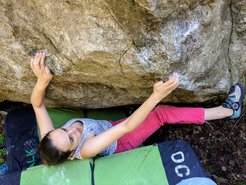The real world through the lens of mathematics
Meet our new doctoral candidate Katharina Buczolich!

We’re happy to introduce you to another new member of our community, Katharina Buczolich!
What drives Katharina’s research is the challenge of using theoretical models to describe real physical phenomena. This focus has led her to pursue her PhD in the “Attosecond Atomic and Solid-State Physics – Theory” group at TU Wien, under the guidance of Assistant Prof. Iva Březinová and Prof. Joachim Burgdörfer.
What’s your main research focus for your PhD?
The main focus of my PhD is correlated high harmonic generation in large atoms. I want to do correlated calculations of xenon and also include relativistic corrections like spin-orbit coupling. Ultimately I want to improve our understanding on the role of correlations and relativistic corrections in attosecond physics.
What excites you most about this field?
How models can describe real physical phenomena. I think it is always amazing that mathematical equations can describe the real world around us. Furthermore, I find it fascinating how much complexity there is in such a 'simple' systems as just a single atom.
What and where did you study?
After graduating from an engineering high school, I came to Vienna to study. I started my bachelors in both physics and electrical engineering at TU Wien and quickly realized that my main interests lay in physics. For my physics master's thesis, I joined the group of Iva Březinová, where I am now also doing PhD.
What attracted you to the IMPRS-APS program?
The chance to exchange ideas with the other PhD students there. Having such a broad network of different groups, both in theory and experiment, is really a valuable opportunity for a young researcher.
What skills do you want to develop during your PhD?
Besides all the physics one learns during their PhD, I think the most important skill we learn is how to approach a new problem and determine how we can contribute to its solution. Furthermore, being able to focus on small details without losing sight of the bigger picture and to communicate our research to others with different backgrounds. On a daily basis, however, it is about self-motivation and learning how we work best.
What’s a fun fact or hobby you enjoy outside of research?
In my free time, I like to either cook or do sports. Especially the latter is a much-needed change from sitting at my desk all day. Judo, running and climbing either alone or with friends really help me to clear my head and regain energy for all the challenges ahead.
